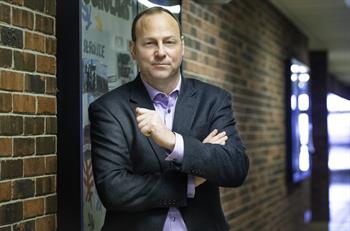 Conspiracy theories seem to be everywhere these days. Name the topic or event, and a quick online search yields links to various sources. How reasonable the findings are depends on the lens an individual examines them with.
Conspiracy theories seem to be everywhere these days. Name the topic or event, and a quick online search yields links to various sources. How reasonable the findings are depends on the lens an individual examines them with.
Dr. Mark R. Huston, Professor of Philosophy and Liberal Arts, and one of the region’s foremost authorities on conspiracy theory, approaches the topic from an academic perspective to try to understand them.
He recently was invited by Lake Michigan College to speak on conspiracy theory, delivering a talk that blended philosophy, psychology, history, political science and other disciplines.
“Part of that academic approach is to provide a neutral definition of conspiracy theories, examine what it means to reason well and how that applies to conspiracy theories,” Dr. Huston said. “We also look at fallacies that may be committed in the course of conspiracy theorizing, examine some of the psychological and epistemological research on conspiracy theories, and wrap up with a brief discussion of conspiracy theory movies.”
Dr. Huston’s interest in conspiracy theory came through literature.
“Some of the greatest literature of the mid-20th century is conspiracy theory literature,” he said. “Some of the authors that write in that genre include: Thomas Pynchon, Ishmael Reed, Don DeLillo, Robert Anton Wilson and several others.
“After that, I started to use conspiracy theories as part of my logic course to help differentiate good from bad arguments and explanations.”
Even though conspiracy theories seem to be more prevalent today, they are hardly new to American society.
“To be clear, conspiracy theories have been a part of the United States since the beginning,” Dr. Huston said. “In fact, in the 1800s some states even had political parties called the Anti-Masons because people were so worried about Freemasonic influence.
“That being said, I think a large part of the modern popularity of conspiracy theories is due to the way that social media silos people and then perpetuates conspiracy theories. There have been several analyses that show how people may start with a relatively innocent first step of interest but due to various social media algorithms they are quickly lead down a rabbit hole.
“Although there is much more that could be said on the topic, that is a big part of the story.”
Dr. Huston is teaching Ethics, Introduction to Philosophy and Bioethics this semester.
“In the Spring semester I will be teaching a face-to-face Philosophy of Religion (PHIL 265) course,” he said. “I am looking forward to getting back into the classroom.”